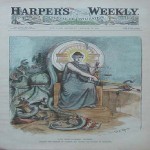The Business of Bigness
 Last summer, Eric Dash of the New York Times wrote an excellent article on the problems associated with big business in the U.S. Dash noted that almost 100 years ago, Supreme Court Justice Louis Brandeis wrote prophetically about the “curse of bigness.” Justice Brandeis denounced generally the influence that big business had on U.S. politics and its economy.
Last summer, Eric Dash of the New York Times wrote an excellent article on the problems associated with big business in the U.S. Dash noted that almost 100 years ago, Supreme Court Justice Louis Brandeis wrote prophetically about the “curse of bigness.” Justice Brandeis denounced generally the influence that big business had on U.S. politics and its economy.
Today, Brandies’s “curse of bigness” is incorporated into the less pejorative term for large U.S. companies — companies that are “too big to fail.” Certainly in light of the recent U.S. financial crisis, people are well aware of the influence that these large U.S. companies have on U.S. politics and its economy. But these “too big to fail” companies may also be creating moral hazards in business operations, and the U.S. has yet to establish a unified system for dealing with the business of bigness.

 The Supreme Court decision in
The Supreme Court decision in  On Friday, February 26, 2010, Marquette University Law School (MULS) will hold its annual Public Service Conference at the Alumni Memorial Union on the Marquette University campus on the increasingly important topic of water law. The conference, entitled “Water and People,” will address water issues in Wisconsin (as well as nationally and internationally), development and the environment, regulation, and water ethics. Statewide leaders from business, government, and non-profit served on a steering committee that worked with Assistant Dean for Public Service, Dan Idzikowski, and myself (I coordinate the MULS water law program) to plan the conference. Based on the group’s efforts, experts from Wisconsin, around the United States, and from Canada will gather to talk about some of the most important topics in the field of water law. The conference will also feature a keynote address by Cameron Davis, senior advisor to the United States EPA Administrator for Great Lakes Restoration. You can learn more about the conference and register for the conference at
On Friday, February 26, 2010, Marquette University Law School (MULS) will hold its annual Public Service Conference at the Alumni Memorial Union on the Marquette University campus on the increasingly important topic of water law. The conference, entitled “Water and People,” will address water issues in Wisconsin (as well as nationally and internationally), development and the environment, regulation, and water ethics. Statewide leaders from business, government, and non-profit served on a steering committee that worked with Assistant Dean for Public Service, Dan Idzikowski, and myself (I coordinate the MULS water law program) to plan the conference. Based on the group’s efforts, experts from Wisconsin, around the United States, and from Canada will gather to talk about some of the most important topics in the field of water law. The conference will also feature a keynote address by Cameron Davis, senior advisor to the United States EPA Administrator for Great Lakes Restoration. You can learn more about the conference and register for the conference at